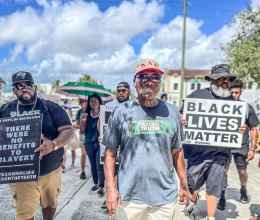
The Collateral Consequences Project helps people charged with a crime understand their options after an arrest.
MIAMI, FL – Today, the American Civil Liberties Union (ACLU) of Florida, Wilkie D. Ferguson, Jr. Bar Association, and the Miami-Dade Public Defender launched the Collateral Consequences Project. This project will provide people charged with a crime, attorneys, including prosecutors and defenders, as well as judges, with basic informational cards to properly educate individuals on the full weight of a plea or a conviction in the state of Florida.
“We want individuals who are directly involved with the criminal legal system to know that when you plead no contest or guilty, or if you’re found guilty by a judge or jury, the judge can enter on your record either a conviction or withhold adjudication. Either can lead to major consequences in addition to your sentence—even when the sentence is credit for time served,” said Joyce Hamilton, director of statewide initiatives at the ACLU of Florida.
The project was inspired by the release of the Greater Miami Chapter of the ACLU of Florida’s 2018 report “Unequal Treatment: Racial and Ethnic Disparities in Miami-Dade.” The report highlighted the need for criminal justice reform efforts in Miami-Dade County which found that “Black people were disproportionately arrested, and Black neighborhoods experienced higher arrest rates.”
“This important project provides easy-to-understand materials that complement the manual What You Don’t Know Can Hurt You: The Collateral Consequences of a Conviction in Florida, which my office published detailing thousands of collateral consequences. Tens of thousands of Floridians are arrested in Florida every year and do not have an attorney representing them in Court. The unrepresented accept plea offers not knowing and not being told of the myriad collateral consequences that will keep them from a good paying job, from renting an apartment or even getting student loans to improve their financial status,” said Carlos J. Martinez, Miami-Dade Public Defender.
“We believe that when we can educate on the collateral consequences of sentencing, it helps to promote more thought and thoughtfulness on the practical effects to the lives of those who are awaiting sentencing. In cases where discretion is granted to judges in sentencing, we aim to help humanize and provide relatable examples of sentencing consequences for those who must live the rest of their lives in the shadow of such decision-making processes,” said Trelvis Randolph, president of Wilkie D. Ferguson, Jr. Bar Association.
The Collateral Consequences project aims to help make sure that everyone involved in the criminal legal system fully understands the consequences of a conviction or withhold of adjudication in misdemeanor, felony, and juvenile cases in Florida. This includes teaching the impact that a conviction or withhold has in vital areas of life, such as employment, housing, and educational opportunities, as well as their impact on fundamental issues such as voting rights and immigration status.
A copy of the “Unequal Treatment: Racial and Ethnic Disparities in Miami-Dade Criminal Justice” report can be found here.
A copy of the “Charged With a Crime? Know What You’re Facing” palm card can be found here.
A copy of the “Major Collateral Consequences From Felony, Misdemeanor, and Juvenile Convictions and Withholds” bench card can be found here.
A copy of the “What You Don’t Know Can Hurt You: Collateral Consequences of a Conviction in Florida” manual can be found here.
To learn more about the project, visit our webpage: aclufl.org/CollateralConsequences






